北师大版(2019)必修第三册Unit 9 Learning- Learning Language points 课件(28张ppt)-
文档属性
| 名称 | 北师大版(2019)必修第三册Unit 9 Learning- Learning Language points 课件(28张ppt)- | 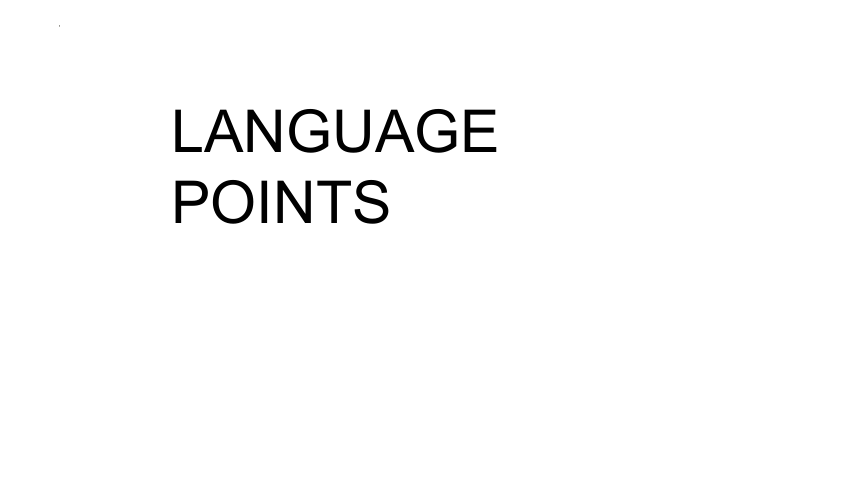 | |
| 格式 | zip | ||
| 文件大小 | 182.3KB | ||
| 资源类型 | 教案 | ||
| 版本资源 | 北师大版(2019) | ||
| 科目 | 英语 | ||
| 更新时间 | 2022-07-02 18:26:20 | ||
图片预览

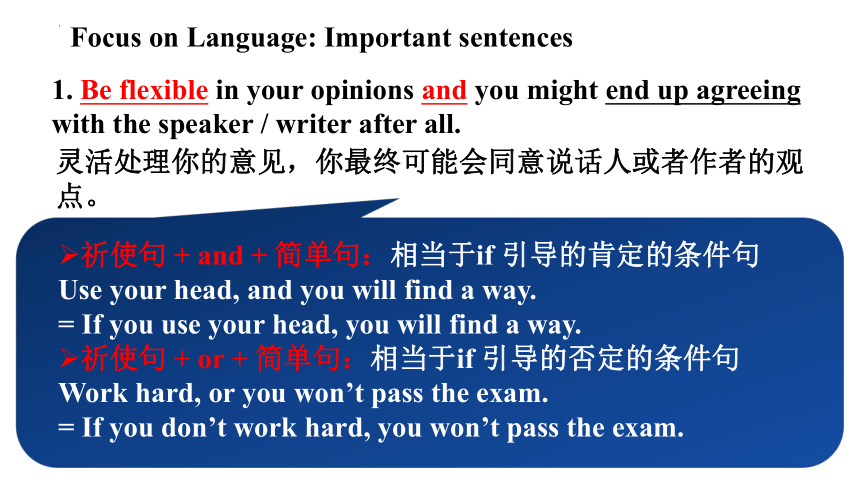
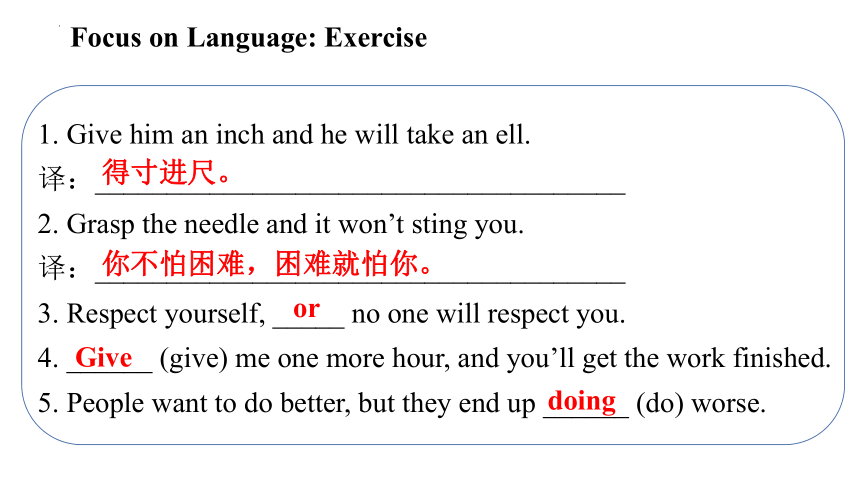
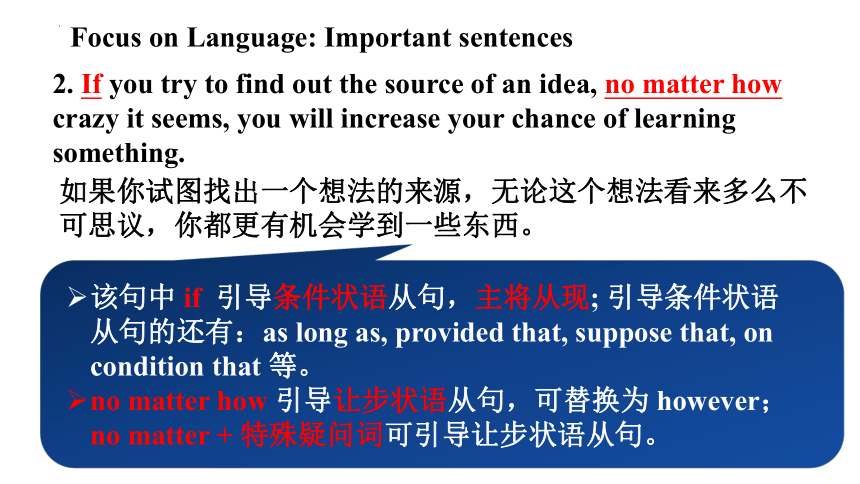
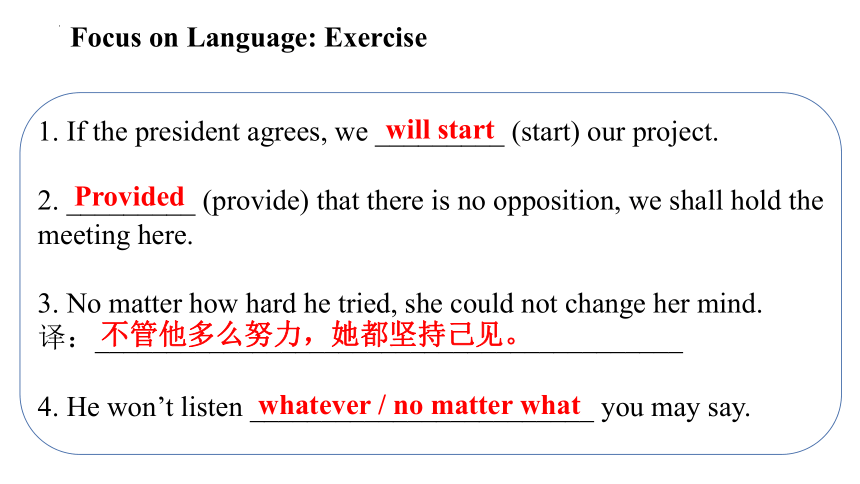
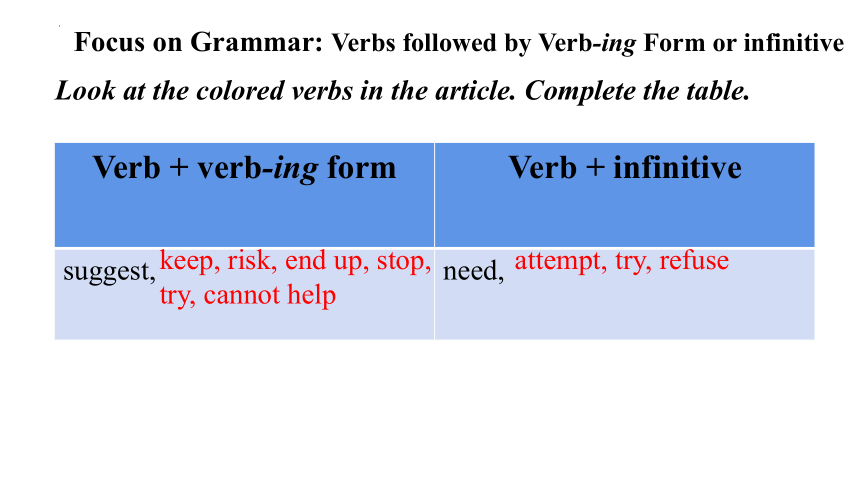
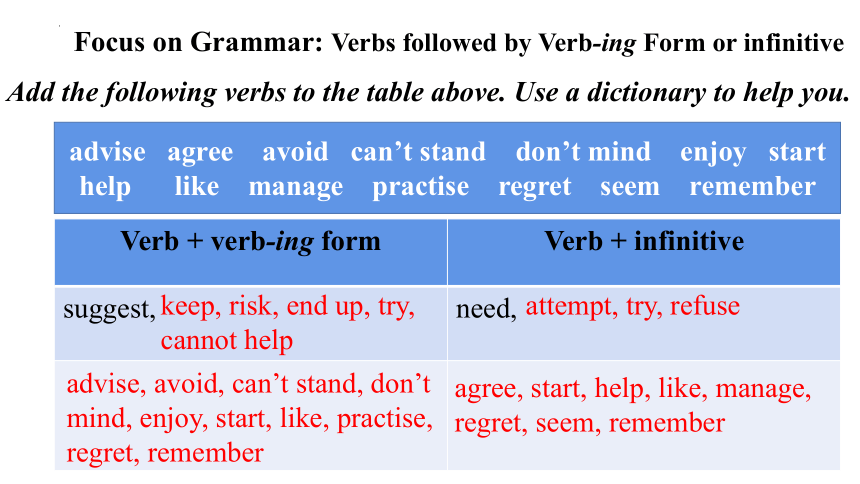
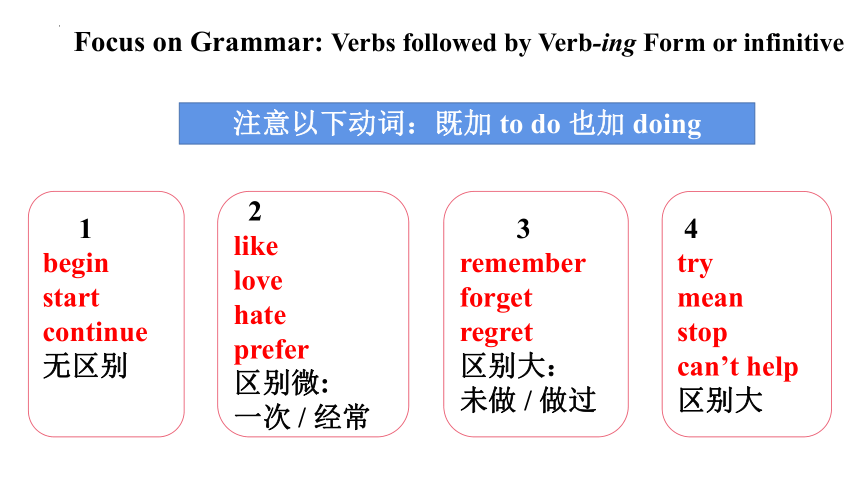
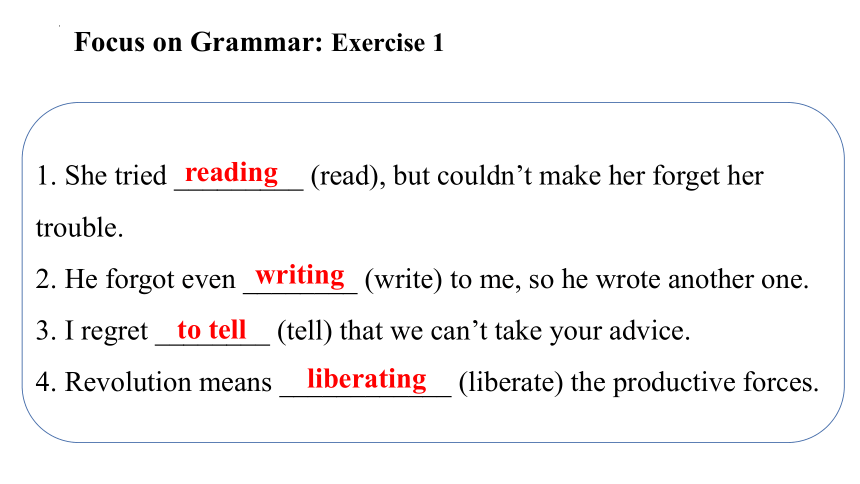
文档简介
(共28张PPT)
LANGUAGE
POINTS
1. Be flexible in your opinions and you might end up agreeing with the speaker / writer after all.
祈使句 + and + 简单句:相当于if 引导的肯定的条件句
Use your head, and you will find a way.
= If you use your head, you will find a way.
祈使句 + or + 简单句:相当于if 引导的否定的条件句
Work hard, or you won’t pass the exam.
= If you don’t work hard, you won’t pass the exam.
灵活处理你的意见,你最终可能会同意说话人或者作者的观点。
Focus on Language: Important sentences
1. Give him an inch and he will take an ell.
译:_____________________________________
2. Grasp the needle and it won’t sting you.
译:_____________________________________
3. Respect yourself, _____ no one will respect you.
4. ______ (give) me one more hour, and you’ll get the work finished.
5. People want to do better, but they end up ______ (do) worse.
得寸进尺。
你不怕困难,困难就怕你。
Give
or
doing
Focus on Language: Exercise
2. If you try to find out the source of an idea, no matter how crazy it seems, you will increase your chance of learning something.
如果你试图找出一个想法的来源,无论这个想法看来多么不可思议,你都更有机会学到一些东西。
该句中 if 引导条件状语从句,主将从现; 引导条件状语从句的还有:as long as, provided that, suppose that, on condition that 等。
no matter how 引导让步状语从句,可替换为 however;no matter + 特殊疑问词可引导让步状语从句。
Focus on Language: Important sentences
1. If the president agrees, we _________ (start) our project.
2. _________ (provide) that there is no opposition, we shall hold the meeting here.
3. No matter how hard he tried, she could not change her mind.
译:_________________________________________
4. He won’t listen ________________________ you may say.
will start
Provided
whatever / no matter what
不管他多么努力,她都坚持己见。
Focus on Language: Exercise
Look at the colored verbs in the plete the table.
Verb + verb-ing form Verb + infinitive
suggest, need,
keep, risk, end up, stop, try, cannot help
attempt, try, refuse
Focus on Grammar: Verbs followed by Verb-ing Form or infinitive
Verb + verb-ing form Verb + infinitive
suggest, need,
keep, risk, end up, try, cannot help
advise, avoid, can’t stand, don’t mind, enjoy, start, like, practise, regret, remember
attempt, try, refuse
agree, start, help, like, manage, regret, seem, remember
Add the following verbs to the table above. Use a dictionary to help you.
advise agree avoid can’t stand don’t mind enjoy start
help like manage practise regret seem remember
Focus on Grammar: Verbs followed by Verb-ing Form or infinitive
注意以下动词:既加 to do 也加 doing
1
begin
start
continue
无区别
2
like
love
hate
prefer
区别微:
一次 / 经常
3
remember
forget
regret
区别大:
未做 / 做过
4
try
mean
stop
can’t help区别大
Focus on Grammar: Verbs followed by Verb-ing Form or infinitive
1. She tried _________ (read), but couldn’t make her forget her trouble.
2. He forgot even ________ (write) to me, so he wrote another one.
3. I regret ________ (tell) that we can’t take your advice.
4. Revolution means ____________ (liberate) the productive forces.
reading
writing
to tell
liberating
Focus on Grammar: Exercise 1
Recently, I’ve managed 1 __________ (become) a more active learner. When I’m reading a book or listening to my teacher, I try 2 _________ (forget) what I’ve learnt before or what I think about the book or the person giving me the information and practice 3 _____________ (concentrate) on the information itself. At the beginning, I found it difficult to do this and I couldn’t help
to become
to forget
concentrating
Focus on Grammar: Exercise 2
4 ___________ (question) the ideas I was reading or hearing. But now I’ve learnt to avoid 5 _________ (listen) to my inner voice all the time and sometimes I even argue with it. On the other hand, I also attempt 6 ______ (ask) as many questions as I can. I ask my teachers a lot of questions and I’ve noticed that the answers to the questions have really helped me understand the topic a lot better.
questioning
listening
to ask
Focus on Grammar: Exercise
1. This is because when we experience things for the first time, we often have strong feelings of fear or excitement.
这是因为我们第一次经历事物时,常常会产生强烈的恐惧感或者兴奋感。
This is because ... 这是因为…… This is why ... 这是为什么……
From space, the earth looks blue. This is ________ about seventy-one percent of its surface is covered by water.
Smoking does harm to your health. That is _______ millions of people die from the habit.
why
because
Focus on Language: Important sentences
2. As a result, we remember them much better, as telling events helps fix experiences in our memories.
重复事件能加强我们对事件的印象,我们能更好的记住这些经历。
as 常见的固定短语:
as a result / as a result of (由于……的结果) as a whole (就整体来说) as follows (如下 ) as above (如上) as usual (照常) / as a (general) rule (通常) as a matter of fact (事实上) as soon as possible / as early as possible / as quickly as possible
Focus on Language: Important sentences
as 作连词的用法:
1. 引导时间状语从句。与while意义相近,强调两个动作同时发生;或
某事一发生,另一事立刻发生。eg:
① He shouted aloud as he ran along.
② I was startled as he opened the door.
③ We get wiser as we get older.
2. 引导原因状语从句,与because的用法相近。
① As it was getting very late, we soon turned back.
② We must stop writing now, as I have rather a lot of work to do.
Focus on Language: Important sentences
as 作连词的用法:
3. 引导方式状语从句,作“正如,好像,按照”解。主要的句式有as if / as though; just as / just as … as. eg:
① When in Rome, do as Romans do.
② We do farm work as the old peasant teaches us.
4. 引导让步状语从句;作“虽然,尽管”解。这时从句常用倒状语序,即把从句中的表语、状语或动词原形放在as之前。eg:
① Child as she is, she knows a lot.
② Busy as he is, he insists on studying.
③ Try as he might, Tom could not get out of the difficulties.
Focus on Language: Important sentences
3. When remembering something new, try to connect it to our emotions.
要记住新内容,试着把内容和情感建立联系。
在含有状语从句的复合句中
1. when, while, as, once, whenever引导的时间状语从句; 2. if, unless引导的条件状语从句;
3. though, although, even if, even though引导的让步状语从句;
4. as though, as if, as引导的方式状语从句;
5. wherever引导的地点状语从句。
若从句的主语与主句的主语相同,且在谓语中含有be时,常省略从句的主语和be。
Focus on Language: Important sentences
1. ______________________ (在北京的时候), I paid a visit to the Summer Palace.
2. _____________________ (当是个年轻人的时候), Abraham Lincoln was a storekeeper and a postmaster.
3. He has no money. ______ (要是有的话), he will give us. 4. ______________ (除非修理), the machine is of no use. 5. ______________________ (要是给更多的关注), the boy could have turned out better.
6. A girl stood at the gate of the school as if ____________________
(正在跟老师讲话).
When / While in Beijing
When / As a young man
If any
Unless repaired
If given more attention to
talking with a teacher
Focus on Language: Important sentences
1. Retelling events _______ (help) fix experiences in our memories.
2. There ________ (be) some people who do have amazing memories.
3. They _______ (be) both good at remembering particular things for a limited time.
4. One of the golden rules to increase how much we remember ___ (be) to review the material periodically.
Sentence Builder
Circle the subjects of the sentences in the sentence builder. Then use the correct form of the verbs to complete the sentences.
Focus on Grammar: Subject-Verb Agreement
helps
are
are
is
主谓一致是指主语和谓语要保持人称和数上的一致,主语的“人称”和“数”决定谓语动词的变化。
但是如果主语不是单一的,或主语名词的数比较特殊时,其主谓一致一般要根据语法一致\意义一致\就近原则.
Focus on Grammar: Subject-Verb Agreement
1. and连接两个或两个以上单数名词或者代词作主语的时候,谓语动词用复数。
(1) He and I ____ both students of this school.
(2) Both rice and wheat grown in this part of China. (be)
注意:由and连接的两个并列主语指同一个人或物,谓语动词用单数,这时后面的名词前没有冠词。
1) The worker and writer ______ our school today. (visit)
2) The worker and the writer _________ to the meeting. (have come / has come)
have come
visits
are
are
语法一致原则
Focus on Grammar: Subject-Verb Agreement
2. 当主语后面跟有as well as, as much as, along with, with, together with , like, rather than, but, except, besides, including等引导的词组时,其谓语动词的单、复数由主语的单、复数而定。
The teacher with two students ______ (be) at the meeting .
E-mail, as well as the telephones, ____________ (play) an important part in daily communication.
A library with five thousand books ___ (be) offered to the nation as a gift.
Nobody but Jane ________ (know) the secret.
is
is playing
is
knows
语法一致原则
Focus on Grammar: Subject-Verb Agreement
3.当主语由不定式、动名词或疑问词引导的句子充当时,谓语动词用单数。
1) To hold the Olympic Games ____ (be) a rich prize for a country. 2) Choosing what to eat ___ no longer as easy as it once was.
3) What we need ____ (be) more time and more materials.
由what, who, why, how, whether等引导的主语从句,谓语动词通常用单数,(但所指的具体内容为复数意义,则可以用复数形式: (What we need are teachers.)
is
is
is
语法一致原则
Focus on Grammar: Subject-Verb Agreement
1. Collective nouns(集体名词)
由集体名词,如group, family, class, government, team, enemy, crowd, company, audience等作主语时,如果看一个整体,谓语动词用单数形式,如果看成其中各成员,则用复数形式。
注意:集体名词为 people, police, 谓语动词用复数
eg: The police are searching for the thief.
意义一致原则
Focus on Grammar: Subject-Verb Agreement
2. Indefinite pronouns(不定代词)
不定代词everybody, everyone, everything, anyone, anybody, anything, someone, somebody, something, nobody, no one, nothing, each, the other 等作主语时,谓语动词用单数。
1. Nothing _____ (be) difficult in the world if you set your mind to it.
2. Everything (be) ready.
3. Someone _______ (want) to see you.
is
is
wants
意义一致原则
Focus on Grammar: Subject-Verb Agreement
就近原则
Focus on Grammar: Subject-Verb Agreement
A or B
Not A but B
Either A or B
Neither A nor B
Not only A but also B
+ Verb
Here
There
+ Verb
A and B
A , B and C
1. Not only you but also he ____ wrong. (is / are)
2. Neither you nor he ___ right. (is / are)
3. There ____ two shops and a cinema beside the railway station. (is / are)
4. Here ____ a map and a handbook for you. (is / are)
is
is
are
is
就近原则
Focus on Grammar: Subject-Verb Agreement
VI
Homework
How will you learn actively in the future Make a list and explain pare and discuss your list with your group members.
Homework
LANGUAGE
POINTS
1. Be flexible in your opinions and you might end up agreeing with the speaker / writer after all.
祈使句 + and + 简单句:相当于if 引导的肯定的条件句
Use your head, and you will find a way.
= If you use your head, you will find a way.
祈使句 + or + 简单句:相当于if 引导的否定的条件句
Work hard, or you won’t pass the exam.
= If you don’t work hard, you won’t pass the exam.
灵活处理你的意见,你最终可能会同意说话人或者作者的观点。
Focus on Language: Important sentences
1. Give him an inch and he will take an ell.
译:_____________________________________
2. Grasp the needle and it won’t sting you.
译:_____________________________________
3. Respect yourself, _____ no one will respect you.
4. ______ (give) me one more hour, and you’ll get the work finished.
5. People want to do better, but they end up ______ (do) worse.
得寸进尺。
你不怕困难,困难就怕你。
Give
or
doing
Focus on Language: Exercise
2. If you try to find out the source of an idea, no matter how crazy it seems, you will increase your chance of learning something.
如果你试图找出一个想法的来源,无论这个想法看来多么不可思议,你都更有机会学到一些东西。
该句中 if 引导条件状语从句,主将从现; 引导条件状语从句的还有:as long as, provided that, suppose that, on condition that 等。
no matter how 引导让步状语从句,可替换为 however;no matter + 特殊疑问词可引导让步状语从句。
Focus on Language: Important sentences
1. If the president agrees, we _________ (start) our project.
2. _________ (provide) that there is no opposition, we shall hold the meeting here.
3. No matter how hard he tried, she could not change her mind.
译:_________________________________________
4. He won’t listen ________________________ you may say.
will start
Provided
whatever / no matter what
不管他多么努力,她都坚持己见。
Focus on Language: Exercise
Look at the colored verbs in the plete the table.
Verb + verb-ing form Verb + infinitive
suggest, need,
keep, risk, end up, stop, try, cannot help
attempt, try, refuse
Focus on Grammar: Verbs followed by Verb-ing Form or infinitive
Verb + verb-ing form Verb + infinitive
suggest, need,
keep, risk, end up, try, cannot help
advise, avoid, can’t stand, don’t mind, enjoy, start, like, practise, regret, remember
attempt, try, refuse
agree, start, help, like, manage, regret, seem, remember
Add the following verbs to the table above. Use a dictionary to help you.
advise agree avoid can’t stand don’t mind enjoy start
help like manage practise regret seem remember
Focus on Grammar: Verbs followed by Verb-ing Form or infinitive
注意以下动词:既加 to do 也加 doing
1
begin
start
continue
无区别
2
like
love
hate
prefer
区别微:
一次 / 经常
3
remember
forget
regret
区别大:
未做 / 做过
4
try
mean
stop
can’t help区别大
Focus on Grammar: Verbs followed by Verb-ing Form or infinitive
1. She tried _________ (read), but couldn’t make her forget her trouble.
2. He forgot even ________ (write) to me, so he wrote another one.
3. I regret ________ (tell) that we can’t take your advice.
4. Revolution means ____________ (liberate) the productive forces.
reading
writing
to tell
liberating
Focus on Grammar: Exercise 1
Recently, I’ve managed 1 __________ (become) a more active learner. When I’m reading a book or listening to my teacher, I try 2 _________ (forget) what I’ve learnt before or what I think about the book or the person giving me the information and practice 3 _____________ (concentrate) on the information itself. At the beginning, I found it difficult to do this and I couldn’t help
to become
to forget
concentrating
Focus on Grammar: Exercise 2
4 ___________ (question) the ideas I was reading or hearing. But now I’ve learnt to avoid 5 _________ (listen) to my inner voice all the time and sometimes I even argue with it. On the other hand, I also attempt 6 ______ (ask) as many questions as I can. I ask my teachers a lot of questions and I’ve noticed that the answers to the questions have really helped me understand the topic a lot better.
questioning
listening
to ask
Focus on Grammar: Exercise
1. This is because when we experience things for the first time, we often have strong feelings of fear or excitement.
这是因为我们第一次经历事物时,常常会产生强烈的恐惧感或者兴奋感。
This is because ... 这是因为…… This is why ... 这是为什么……
From space, the earth looks blue. This is ________ about seventy-one percent of its surface is covered by water.
Smoking does harm to your health. That is _______ millions of people die from the habit.
why
because
Focus on Language: Important sentences
2. As a result, we remember them much better, as telling events helps fix experiences in our memories.
重复事件能加强我们对事件的印象,我们能更好的记住这些经历。
as 常见的固定短语:
as a result / as a result of (由于……的结果) as a whole (就整体来说) as follows (如下 ) as above (如上) as usual (照常) / as a (general) rule (通常) as a matter of fact (事实上) as soon as possible / as early as possible / as quickly as possible
Focus on Language: Important sentences
as 作连词的用法:
1. 引导时间状语从句。与while意义相近,强调两个动作同时发生;或
某事一发生,另一事立刻发生。eg:
① He shouted aloud as he ran along.
② I was startled as he opened the door.
③ We get wiser as we get older.
2. 引导原因状语从句,与because的用法相近。
① As it was getting very late, we soon turned back.
② We must stop writing now, as I have rather a lot of work to do.
Focus on Language: Important sentences
as 作连词的用法:
3. 引导方式状语从句,作“正如,好像,按照”解。主要的句式有as if / as though; just as / just as … as. eg:
① When in Rome, do as Romans do.
② We do farm work as the old peasant teaches us.
4. 引导让步状语从句;作“虽然,尽管”解。这时从句常用倒状语序,即把从句中的表语、状语或动词原形放在as之前。eg:
① Child as she is, she knows a lot.
② Busy as he is, he insists on studying.
③ Try as he might, Tom could not get out of the difficulties.
Focus on Language: Important sentences
3. When remembering something new, try to connect it to our emotions.
要记住新内容,试着把内容和情感建立联系。
在含有状语从句的复合句中
1. when, while, as, once, whenever引导的时间状语从句; 2. if, unless引导的条件状语从句;
3. though, although, even if, even though引导的让步状语从句;
4. as though, as if, as引导的方式状语从句;
5. wherever引导的地点状语从句。
若从句的主语与主句的主语相同,且在谓语中含有be时,常省略从句的主语和be。
Focus on Language: Important sentences
1. ______________________ (在北京的时候), I paid a visit to the Summer Palace.
2. _____________________ (当是个年轻人的时候), Abraham Lincoln was a storekeeper and a postmaster.
3. He has no money. ______ (要是有的话), he will give us. 4. ______________ (除非修理), the machine is of no use. 5. ______________________ (要是给更多的关注), the boy could have turned out better.
6. A girl stood at the gate of the school as if ____________________
(正在跟老师讲话).
When / While in Beijing
When / As a young man
If any
Unless repaired
If given more attention to
talking with a teacher
Focus on Language: Important sentences
1. Retelling events _______ (help) fix experiences in our memories.
2. There ________ (be) some people who do have amazing memories.
3. They _______ (be) both good at remembering particular things for a limited time.
4. One of the golden rules to increase how much we remember ___ (be) to review the material periodically.
Sentence Builder
Circle the subjects of the sentences in the sentence builder. Then use the correct form of the verbs to complete the sentences.
Focus on Grammar: Subject-Verb Agreement
helps
are
are
is
主谓一致是指主语和谓语要保持人称和数上的一致,主语的“人称”和“数”决定谓语动词的变化。
但是如果主语不是单一的,或主语名词的数比较特殊时,其主谓一致一般要根据语法一致\意义一致\就近原则.
Focus on Grammar: Subject-Verb Agreement
1. and连接两个或两个以上单数名词或者代词作主语的时候,谓语动词用复数。
(1) He and I ____ both students of this school.
(2) Both rice and wheat grown in this part of China. (be)
注意:由and连接的两个并列主语指同一个人或物,谓语动词用单数,这时后面的名词前没有冠词。
1) The worker and writer ______ our school today. (visit)
2) The worker and the writer _________ to the meeting. (have come / has come)
have come
visits
are
are
语法一致原则
Focus on Grammar: Subject-Verb Agreement
2. 当主语后面跟有as well as, as much as, along with, with, together with , like, rather than, but, except, besides, including等引导的词组时,其谓语动词的单、复数由主语的单、复数而定。
The teacher with two students ______ (be) at the meeting .
E-mail, as well as the telephones, ____________ (play) an important part in daily communication.
A library with five thousand books ___ (be) offered to the nation as a gift.
Nobody but Jane ________ (know) the secret.
is
is playing
is
knows
语法一致原则
Focus on Grammar: Subject-Verb Agreement
3.当主语由不定式、动名词或疑问词引导的句子充当时,谓语动词用单数。
1) To hold the Olympic Games ____ (be) a rich prize for a country. 2) Choosing what to eat ___ no longer as easy as it once was.
3) What we need ____ (be) more time and more materials.
由what, who, why, how, whether等引导的主语从句,谓语动词通常用单数,(但所指的具体内容为复数意义,则可以用复数形式: (What we need are teachers.)
is
is
is
语法一致原则
Focus on Grammar: Subject-Verb Agreement
1. Collective nouns(集体名词)
由集体名词,如group, family, class, government, team, enemy, crowd, company, audience等作主语时,如果看一个整体,谓语动词用单数形式,如果看成其中各成员,则用复数形式。
注意:集体名词为 people, police, 谓语动词用复数
eg: The police are searching for the thief.
意义一致原则
Focus on Grammar: Subject-Verb Agreement
2. Indefinite pronouns(不定代词)
不定代词everybody, everyone, everything, anyone, anybody, anything, someone, somebody, something, nobody, no one, nothing, each, the other 等作主语时,谓语动词用单数。
1. Nothing _____ (be) difficult in the world if you set your mind to it.
2. Everything (be) ready.
3. Someone _______ (want) to see you.
is
is
wants
意义一致原则
Focus on Grammar: Subject-Verb Agreement
就近原则
Focus on Grammar: Subject-Verb Agreement
A or B
Not A but B
Either A or B
Neither A nor B
Not only A but also B
+ Verb
Here
There
+ Verb
A and B
A , B and C
1. Not only you but also he ____ wrong. (is / are)
2. Neither you nor he ___ right. (is / are)
3. There ____ two shops and a cinema beside the railway station. (is / are)
4. Here ____ a map and a handbook for you. (is / are)
is
is
are
is
就近原则
Focus on Grammar: Subject-Verb Agreement
VI
Homework
How will you learn actively in the future Make a list and explain pare and discuss your list with your group members.
Homework
同课章节目录
- Unit 7 Art
- Lesson 1 Masterpieces
- Lesson 2 Beijing Opera
- Lesson 3 A Musical Genius
- Unit 8 Green living
- Lesson 1 Roots and Shoots
- Lesson 2 Greening the Desert
- Lesson 3 "White Bikes" on the Road
- Unit 9 Learning
- Lesson 1 Active Learning
- Lesson 2 Language Learning Tips
- Lesson 3 The Secrets of Your Memory
